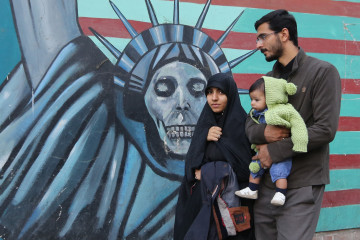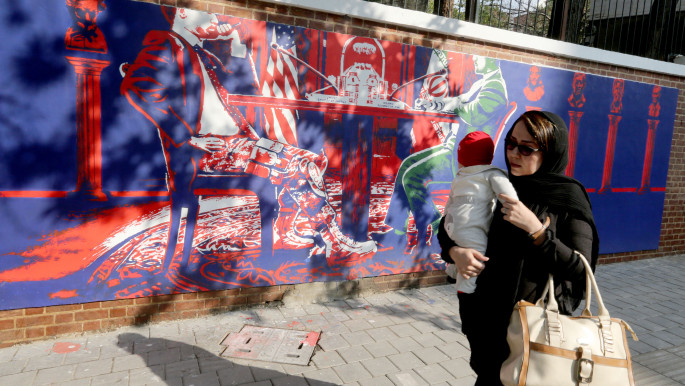

"After years of visiting infertility treatment centres, we discovered that we were unable to have children. I suffer from a medical condition that means I can't get pregnant. I had treatment for 20 years but none of it worked". This is how Farida, an Iranian in her forties from Tehran, starts her conversation with Al-Araby Al-Jadeed, The New Arab's Arabic language sister publication.
"Then one of my friends suggested a solution: surrogacy". This is an option increasing numbers of Iranian couples are turning to upon discovering that they cannot have children naturally.
"Initially I refused point blank, and so did my husband. This was two years ago. How could another woman give birth to my child? However, my husband brought it up again several months ago and finally convinced me. He has always been dedicated to me over 20 years of marriage and our love has always been strong, which is something I cherish - there are men out there who divorce their wives if they cannot have children".
"Then one of my friends suggested a solution: surrogacy". This is an option increasing numbers of Iranian couples are turning to upon discovering that they cannot have children naturally"
Poverty driving women to become surrogates
On the other side of the coin is Mariam (30), who felt obliged to become a surrogate mother due to the pressures of poverty. In this way, she can help both her husband and her family through the money she earns as well as helping another family realise their dream of having a child. She is currently in her fifth month of pregnancy.
It is the third time she has done this. Mariam says she will earn "around $4,000 for carrying the couple's embryo for nine months. The wife lost her uterus due to cancer".
She explains that the conditions governing surrogacy in Iran are "very complicated, and not all women are able to do it. Women need to have had at least one healthy child in the past, and they have to be healthy. They have to undergo various checks to confirm their physical and mental health.
"I have a strong heart, and this helps me handle the consequences of surrogacy". Mariam mentions a friend of hers who was a surrogate mother who became severely depressed for four years after giving birth. She refused to do it a second time.
|
|
Mariam points out an aspect which can be too emotionally painful for some to bear: "It is forbidden for the surrogate to even have a glimpse of the child after the birth, who is delivered quickly to its biological parents".
A complex web: "Terms and Conditions"
The Royan Institute for Infertility Treatment is the largest centre in Iran specialising in artificial insemination for surrogacy. The institute has established its own complex set of terms and conditions around the process, according to Dr Ahmad Vosough, Deputy Director of Treatment and Specialized Services.
"The wife must be incapable of undergoing pregnancy and childbirth. Possible reasons could be that she suffers from a congenital disease of the uterus or has had a hysterectomy. Or she might have a heart condition, meaning that her life could be at risk either during pregnancy or childbirth.
"The institute prohibits divorcees and widows from becoming surrogates because this might cause rumours to be spread about them. We don't want them to come under pressure from society in that way"
"Regarding the surrogate, they must have previously given birth to a healthy child, and they must be married. Their husband also needs to agree and sign the agreement between the surrogate mother and the commissioning couple. There are also conditions which relate to the social, ethical and psychological aspects such as having good mental health and having no addictions".
Vosough emphasises that "the institute prohibits divorcees and widows from becoming surrogates because this might cause rumours to be spread about them. We don't want them to come under pressure from society in that way". However, not all medical centres apply this condition.
At Royan, the surrogate can be chosen in two ways: either the couple will nominate them, and the woman in question will be a relative or acquaintance, or the institute will give possible options and the couple will choose from them. Vosough describes surrogacy as humanitarian work because it can alleviate the despair felt by couples who are infertile.
Lack of law not a barrier
There are no specific laws on surrogacy in Iran, according to Iranian judge Mohammad Reza Rezvani Mo’allem. However, he adds that "the absence of laws is not prohibitive, because Article 167 of the Iranian constitution states that reliable Islamic sources and sanctioned fatwas should be used in the absence of laws".
Mo'allem explains that "surrogacy in Iran leans on the fatwas of some religious clerics who have allowed it. Iran's Supreme Leader and Grand Ayatollah Ali Khamenei has given his blessing to the practice and this has ultimately held sway, as has been the case with other contentious issues, although there are Islamic jurists who are opposed".
In terms of legal jurisprudence, he points out that there are arguments over the identity of the mother of the child born via a surrogate uterus, and if this is the woman who the egg belongs to or the birth mother: "Most jurists view the biological mother as the mother of the child. However, the contract between the biological parents and the surrogate mother settles the dispute, as it states that the biological parents are the real parents".
"Surrogacy in Iran leans on the fatwas of some religious clerics who have allowed it. Iran's Supreme Leader and Grand Ayatollah Ali Khamenei has given his blessing to the practice and this has ultimately held sway"
He outlines duties commonly listed on these contracts: "The biological parents must cover all expenses during the pregnancy. This includes the cost of transplanting the embryo, the necessary medical checks, food costs and so on for the surrogate. As for the surrogate mother, she may pledge to uphold various commitments such as not to have an abortion and to stick to medical and health advice, such as not smoking or drinking alcohol".
Possible dilemmas due to legal loopholes
Despite being largely permitted, surrogacy in Iran is not free from complications. Mo'allem explains that the lack of legal regulation on all aspects of the issue has left important questions unanswered from the legal perspective.
"For example, the surrogate mother could get ill during the pregnancy. If the disease is life-threatening there are questions over whether she can abort. Likewise, if it emerges that the foetus suffers from a disability and its parents want an abortion but the surrogate is against that, what is the answer?".
He gives another way that surrogates and commissioning parents can come up against the lack of legal provision on this issue: "There is the question of the identity that the pregnant mother gives the hospital when she goes to give birth: if she uses the biological mother's name, this is considered identity fraud and she could theoretically be punished. If she gives her own name, then she will be registered as the child's mother - the biological parents will then face a dilemma when the identity papers are issued".
However, on this front Mariam is not worried. She says she entered the hospital using the biological mother's name: "All surrogate mothers are doing that, as we know that when hospital reviews are carried out officials won't ask for our ID papers".
This is an edited translation from our Arabic edition. To read the original article click here.
Translated by Rose Chacko





 Follow the Middle East's top stories in English at The New Arab on Google News
Follow the Middle East's top stories in English at The New Arab on Google News


